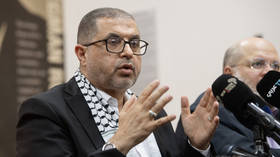‘Resistance will be violent’: What’s next for Israel and Gaza as the conflict goes on?

“It will happen – there’s a date,” reassured Prime Minister Benjamin Netanyahu on Monday, referring to the Rafah offensive that’s aimed at eliminating the remaining battalions of Hamas, the Islamic movement responsible for the massacre on October 7, 2023 that claimed the lives of more than 1,200 Israelis.
The international community is objecting to the planned assault, fearing it will lead to a high death toll. The area – approximately 64 square kilometers – is now home to 1.3 million Gazans who have escaped from the north and center, where clashes between Israeli security forces and Palestinian fighters are still raging.
The Israeli prime minister however, is determined to go ahead. Last month, the IDF presented its plans for the takeover of the area. Once the green light is given, the army will move in, and experts say it is just a matter of months until Rafah falls into the hands of the Israelis.
But what are Israel’s plans for the longer term? RT spoke to two political analysts to discuss possible scenarios for the “day after,” the reaction of Gazans and the Arab world, and what it could mean for Israel. In Jerusalem: Yoni Ben Menachem, a veteran journalist and an author specializing in the Middle East, and in Istanbul: Shadi Abdelrahman, a Gaza native, who escaped the territory shortly before the war.
Scenario One: re-occupation of Gaza under full Israeli control
Ben Menachem: A full occupation of Gaza might only be possible as a temporary solution to dismantle the battalions of Hamas. The group is now concentrated in Rafah and a couple refugee camps in the center, so Israel will operate there to make sure that the threat is gone and that their military infrastructure is eliminated.
Once this is achieved, Israel will establish a buffer zone – that will be one kilometer wide – in the north of the enclave to protect Israel’s southern communities, but it has no plans to remain there forever. Gazans will reject it, [and] Hamas will fight against it, endangering our soldiers and staging terror attacks against civilians. The Arab world and the international community will also stand against it – so a full re-occupation of the strip is unsustainable in the long term, and Prime Minister Netanyahu has already stated that he had no such plans.
Abdelrahman: I don’t think Israel will make the mistake of re-occupying the strip. First of all, it wouldn’t want to take responsibility for a place with very few resources and with a population that largely lives below the poverty line. But if for some reason they do decide to recapture it, Gazans will not take it lightly, primarily because they see how Israel is limiting Palestinians’ freedom of movement in the West Bank, how they storm Palestinian houses, how they erect checkpoints and arrest those they deem terrorists – so they won’t want to see that taking place in Gaza as well.
The population in Gaza is more aggressive than in the West Bank, and if Israel does decide to try its luck, the resistance will be strong and Israel will be paying a very high price.
Here, I am not only talking about throwing stones, although that will occur too. There will be attacks on settlements and on soldiers and that means that Israel will need to fork out a pretty penny for their security, something that Tel Aviv is not ready to do. This cycle of violence will continue as long as Israel remains in the strip and I am pretty sure that soon enough they will understand that they need to evacuate, just as they did in 2005.
International pressure might also play a role but I am not counting on it that much. Protests will be staged against this occupation here and there but governments, either in the Arab world, or the West, will remain largely silent. So everything will depend on Palestinians’ resistance and this, I can assure you, will be violent.
Scenario Two: Israeli military control and Palestinian Authority civil control
Ben Menachem: For Israel, a scenario where the Palestinian Authority controls the civil life in the Gaza Strip is the last option, and it will happen only if Israel fails to find a partner whom it can trust and who can govern the enclave, or if Netanyahu yields to American pressure.
Right now, Netanyahu strongly opposes this scenario primarily because Israel considers the PA as an inciting force. It believes it supports, finances and educates terror. But the PM is also rejecting this idea because of political considerations. Inside his own coalition there are several hawkish voices, including those of Finance Minister Betzalel Smotrich and Homeland Security Minister Itamar Ben Gvir, who oppose the idea of the PA governing the Strip. Netanyahu is fearful of losing their support because if that happens, his coalition will fall and Israel will need to go to the polls.
Abdelrahman: I believe this is the most likely scenario. Israel would want to create a conflict between Palestinian factions over who will control the Gaza Strip. On the one hand, there is the Palestinian Authority that would like to re-establish its control over this territory [from which it was expelled in 2007 following elections won by Hamas – ed.]. They would like to prove that they are the legitimate rulers, who will be representing the Palestinians in the peace process. On the other hand, there is Hamas, who are not planning to relinquish power that easily. So what Israel will do in this case is that it will support one faction against the other, creating tensions and violence between them.
This conflict can easily play into the hands of the Israelis. To the outside world, Israel can claim that these Palestinian factions cannot agree amongst themselves, so how can anyone give them an independent state? They fight with one another, so how can Israel live safely next to them? I am sure they will use this narrative to continue their occupation.
Naturally, the population of Gaza will reject such a scenario because it will only create additional problems for them. As for the Arab states, they will largely not care.
Scenario Three: Israeli military control; civil control by moderate Arab states like Egypt, the UAE and Saudi Arabia
Ben Menachem: This scenario can only exist in the imagination. No Arab country will agree to take such a huge responsibility and invest billions of dollars to reconstruct the area. Two weeks ago, the Arab League already stated that they are not ready to govern the Gaza Strip. It won’t work.
Abdelrahman: Such a scenario is highly unlikely. Although it is very profitable for Israel, the Saudis and the Emiratis will not engage directly with Hamas; they won’t send their troops to fight against the group. Yet their involvement might take place on a financial level. They can be involved in a number of reconstruction projects, they might provide the intelligence to curb the threat of terror but I doubt they will put in place their own civil administration, and if they do, Gazans will reject it. They will treat such a foreign administration just as they treat Israel – as an enemy.
Scenario Four: Full Israeli withdrawal and the establishment of a Palestinian state
Ben Menachem: Israel will of course withdraw from the entire Gaza Strip after it dismantles Hamas and its military infrastructure, but no Palestinian state will be established there. As long as the right-wing government is in power, this option is out of question.
Yet, Israel might go to elections and another government might come to power. But whoever comes, I honestly don’t think that after the massacre of October 7, the public will agree to a Palestinian state. The majority of Israelis are against it, according to public opinion polls. Besides, for such recognition to happen, Israel would need to hold a referendum and the chances that it would pass are slim, at least in the coming years.
Abdelrahman: When we talk about the establishment of a Palestinian state, we need to ask ourselves, what kind of state is it going to be? Many things have changed since the Oslo Accords of 1993 and the process that started back then, when a Palestinian state was supposed to be established over the West Bank and the Gaza Strip. Many things are not applicable anymore. Over the years, Israel has erected many settlements in the West Bank. Plus the American elections will also play a role here. If Donald Trump is going to be re-elected, and I believe he will, he will not allow a Palestinian state to be established. And even if Gaza does become independent, it is probably going to be an unarmed state, something that will not be accepted by the Palestinian factions, especially those with violent ideologies like Hamas and the Palestinian Islamic Jihad. Neither will that be accepted by Iran.
However, the establishment of an independent state in Gaza might play to the hands of Israel. This way, they can say that they gave Palestinians the freedom they have been looking for. Under this scenario, any bullet fired from Gaza could drag the area into a war because the Palestinians, who would be independent, would no longer be able to say that they are fighting an occupation.
Scenario Five: Israel fails to eliminate Hamas
Ben Menachem: Israel can only destroy the infrastructure of Hamas and perhaps eliminate their leaders. But the ideology, the ideas of Hamas will live on. Hamas will remain as a political movement. So honestly speaking I don’t see that this region will see peace. Their hatred towards Jews is only getting stronger because of the war.
Abdelrahman: Israel failed to get any major gains in their ultimate goal to get rid of Hamas. And I don’t see how they can manage to achieve it in the near future. The children who have seen this war, who have lost their parents, will grow up, will want to take revenge for the suffering they have endured, and they will join Hamas. Therefore, the future looks bleak to me because it promises more clashes and violence.
How will the people of Gaza react to Hamas staying? I am sure they will not like this option because they have been living under them since 2007 and witnessed the destruction they brought on the Strip. But Gazans will not be happy with the Palestinian Authority either simply because for all these years they have failed to bring an independent state. So there should be a third option, a third party that can take the lead, but we are still in the dark on who that might be.















